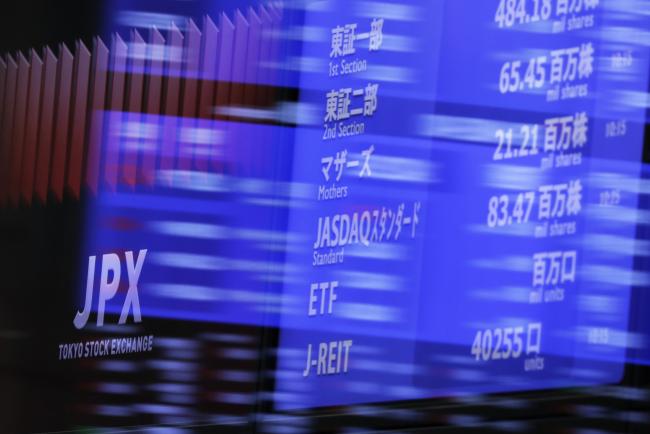(Bloomberg) -- A rout in technology stocks spread to Asia from the U.S. as investors sold some of this year’s best performers and assessed the longevity of the global equity bull run.
Japan’s benchmarks fluctuated and Australian shares fell with lenders declining after the government announced an inquiry into banks. A measure of technology companies was the the biggest drag on the MSCI Asia Pacific Index after U.S. tech stocks tumbled amid signs of a rotation away from the year’s leaders into financial stocks as tax legislation proceeded through the Senate. The kiwi dollar took a hit after New Zealand business confidence slumped to the lowest since 2009.
Senate Republicans voted to begin the debate on their sweeping tax-overhaul bill. Optimism the Senate will pass cuts to corporate taxes is buoying sentiment for corporate earnings growth, with Federal Reserve Chair Janet Yellen’s comments that economic growth is “increasingly broad based” sending Treasuries lower as they added to enthusiasm for economic expansion.
Meanwhile, questions are being raised about how long the markets’ rally can be sustained. Goldman Sachs Group Inc (NYSE:GS). said that the prolonged bull market across stocks, bonds and credit has left a measure of average valuation at the highest since 1900, which eventually will lead to a bear market. And Credit Suisse (SIX:CSGN) Group AG said that the bull run may be entering the last stretch, before petering out in the second half of 2018. They join Morgan Stanley (NYSE:MS) in warning that next year won’t be easy for equity investors.
In Asia, the Bank of Korea raised its key interest rate to 1.5 percent from 1.25 percent, the first hike in more than six years. Japan’s industrial production picked up in October from a year earlier, the 12th consecutive month of gains, underpinned by exports, which are performing at their best since the global financial crisis.
China’s official factory gauge unexpectedly rose as global demand for products helped cushion the effects of a pollution cleanup as officials order polluting mills to shut down or reduce production during winter.
Elsewhere, oil declined before OPEC meets to decide on prolonging supply cuts past the end of March.
Terminal subscribers can read our Markets Live blog.
Here are some key events scheduled for the remainder of this week:
- Japan CPI may show a sharp divergence between headline and core inflation, Bloomberg Intelligence said ahead of the releases on Friday.
- In China, the private Caixin manufacturing PMI is due on Friday.
- India updates on third-quarter GDP on Thursday.
- OPEC meets in Vienna on Thursday.
These are the main moves in markets:
Stocks
- Japan’s Topix index lost 0.2 percent as of 10:49 a.m. in Tokyo and the Nikkei 225 Stock Average fell 0.2 percent.
- Australia’s S&P/ASX 200 Index declined 0.6 percent. The nation’s big four banks were the main drag on the benchmark after Prime Minister Malcolm Turnbull said he would hold a wide-ranging public inquiry into the banks.
- South Korea’s Kospi index dropped 0.7 percent.
- Hong Kong’s Hang Seng Index fell 1.5 percent and the Shanghai Composite Index lost 0.3 percent.
- Futures on the S&P 500 Index was down 0.1 percent. The underlying gauge fell less than 0.05 percent. The Nasdaq Composite Index dropped 1.3 percent and the FANG stocks posted the biggest plunge in almost two years.
- The MSCI Asia Pacific Index declined 0.7 percent.
Currencies
- The Bloomberg Dollar Spot Index was steady.
- The yen fell 0.1 percent to 112.02 per dollar.
- The South Korean won fell 0.4 percent to 1,081.45 after the BOK said it would keep an accommodative stance.
- The New Zealand dollar declined 0.5 percent to 68.48 U.S. cents.
- The euro rose 0.2 percent to $1.1865.
- Bitcoin was back above $10,000 after a tumultuous session.
Bonds
- The yield on 10-year Treasuries was steady at 2.38 percent after climbing six basis points.
- Australia’s 10-year yield gained four basis points to 2.51 percent.
Commodities
- West Texas Intermediate crude was steady at $57.36 a barrel. It fell 1.2 percent in the previous session.
- Gold was little changed at $1,284.79 an ounce.
